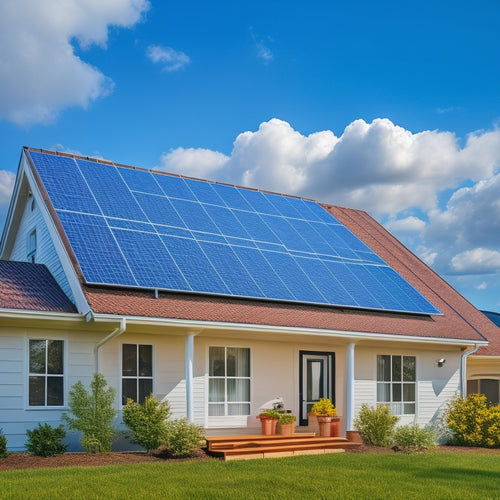
Benefits of a Home Battery Backup System
Share
A home battery backup system gives you energy independence by storing excess power for later use, which translates to lower electricity bills. You won't just rely on the electrical grid, enhancing both your control and preparedness for outages and emergencies. Additionally, these systems allow for the effective use of renewable energy sources, enhancing environmental sustainability. Over time, you'll notice significant cost savings as smart technology optimizes energy usage. Plus, with reliable power during outages, essential devices remain functional. There's so much more to uncover about maximizing the benefits of your home battery system and how it fits into your life.
At a Glance
- Home battery backup systems enhance energy independence by reducing reliance on the electrical grid and promoting self-sufficiency.
- They enable effective use of renewable energy sources, maximizing savings and minimizing carbon footprints.
- These systems can lead to significant cost savings by optimizing energy management and buffering against rising utility rates.
- Homeowners may benefit from various federal and state incentives, making installation more financially appealing.
- Reliable power supply during outages ensures essential devices remain operational, improving emergency preparedness.
Energy Independence at Home
When you invest in a home battery backup system, you greatly reduce your reliance on the grid, giving you more control over your energy usage.
This shift not only enhances your independence but also encourages the use of renewable energy sources, aligning with sustainable practices.
Additionally, these systems promote energy independence by storing excess solar energy for later use, allowing you to maximize savings on electricity bills and contribute to a greener future through eco-friendly solutions.
Reduced Reliance on Grid
A home battery backup system enables you to take control of your energy consumption, markedly reducing your reliance on the electrical grid. By utilizing stored energy, you can minimize your dependence on utility providers, giving you a sense of freedom that off-grid living embodies.
This system enables you to manage your energy usage, especially during peak hours when electricity costs soar.
In addition to financial benefits, a battery backup system improves your emergency preparedness. Imagine being equipped to maintain power during outages, natural disasters, or other unforeseen events. With this technology, you can keep essential devices running, ensuring your family's safety and comfort.
This capability not only enhances your resilience but also cultivates a lifestyle that prioritizes self-sufficiency.
Moreover, reducing your reliance on the grid means you're less affected by fluctuating energy prices and utility rate hikes. You can take charge of your energy future, aligning it with your personal values and goals.
Ultimately, the shift to a battery backup system isn't just about energy; it's about gaining autonomy and embracing a life less tethered to external forces. You deserve that independence.
Increased Renewable Energy Usage
Adopting a home battery backup system greatly enhances your ability to make use of renewable energy sources, allowing you to tap into solar or wind power more effectively. By integrating solar panels with a battery backup, you can store excess energy generated during peak sunlight hours or windy days, ensuring you have power even when conditions aren't ideal.
This solar integration not only maximizes your energy efficiency but also reduces your dependence on traditional energy sources. You're not just generating energy; you're claiming your independence.
Plus, with advancements in battery longevity, modern systems can store energy for extended periods, making it easier to use your renewable energy when you need it most.
Imagine powering your home sustainably while minimizing your carbon footprint. A home battery backup system enables you to make the most of your renewable resources, converting your home into a self-sufficient energy hub.
The more effectively you utilize solar and wind energy, the less vulnerable you become to rising energy costs and potential grid failures. It's time to take control of your energy future and accept the freedom that comes with increased renewable energy usage.
Cost Savings Over Time
Investing in a home battery backup system can greatly reduce your energy bills over time.
By storing excess energy for later use, you lower your reliance on grid power, which can lead to substantial savings.
Plus, you may qualify for various incentives and rebates that make the initial investment even more affordable.
Reduced Energy Bills
Many homeowners are finding that a home battery backup system can lead to significant reductions in energy bills over time. By utilizing smart technology, you can optimize your energy management, allowing you to store energy during off-peak hours when rates are lower. This stored energy can then be used during peak hours when electricity costs soar, ultimately slashing your monthly expenses.
Moreover, a battery backup system can help you gain more control over your energy consumption. You can monitor usage patterns and adjust accordingly, reducing waste. This level of understanding enables you to make informed decisions that align with your financial goals and values, giving you the freedom to choose how you power your home.
Additionally, as utility companies continue to raise rates, having your own energy storage can act as a buffer against rising costs. You'll be less reliant on the grid, which not only saves you money but also contributes to a more sustainable future.
Investing in a home battery backup system is more than just a financial decision; it's a step toward energy independence and long-term savings. Seize this opportunity to take charge of your energy expenses.
Incentives and Rebates
Homeowners can remarkably enhance their savings through various incentives and rebates available for battery backup systems. Federal incentives and state rebates can greatly offset the initial costs, allowing you to invest in energy efficiency with minimal financial strain. Tax credits can further reduce your tax liability, making the decision to install a battery backup system even more persuasive.
Many utility programs offer financial incentives for those who choose renewable energy sources, including battery storage. You might also investigate financing options that allow you to spread the cost over time, making your investment more manageable. Additionally, installation grants are often available, providing further support to lower your upfront expenses.
As you consider the environmental benefits of these systems, remember that reducing your reliance on the grid can contribute to a cleaner, more sustainable future.
Key Technical Specifications
When considering a home battery backup system, understanding its key technical specifications is vital.
You'll want to focus on capacity and power output to guarantee it meets your energy needs, as well as charging time efficiency for peak performance.
Additionally, evaluating battery capacity, cycle life, and maintenance will help you assess the reliability and longevity of the system.
These factors directly impact how well your system functions during outages, making informed choices necessary.
Capacity and Power Output
One of the most crucial factors to evaluate in a home battery backup system is its capacity and power output, which directly influence how effectively it can meet your energy needs during outages.
Capacity, typically measured in kilowatt-hours (kWh), determines how long your system can supply power. If you want to maintain your independence during a blackout, you'll need a system that holds enough capacity to cover your essential loads.
Power output, measured in kilowatts (kW), indicates how much energy the system can deliver at any given moment. A high power output is essential for running appliances that demand significant energy, like refrigerators or HVAC systems.
When selecting a system, consider its battery chemistry as it affects both lifespan and performance.
Lithium-ion batteries, for instance, offer higher energy density and efficiency compared to lead-acid batteries, allowing for better scalability in your system.
This scalability means you can expand your battery capacity as your energy needs grow, ensuring you're not limited by your initial investment.
With the right capacity and power output, you can truly enjoy the freedom that a home battery backup system offers, keeping your life powered and uninterrupted.
Charging Time Efficiency
Understanding charging time efficiency is crucial for maximizing the benefits of your home battery backup system. The charging speed of your system directly impacts how quickly you can restore power during outages. If your battery can recharge rapidly, you'll reduce downtime and improve your energy independence.
Battery chemistry plays a significant role in this efficiency. Lithium-ion batteries, for instance, typically provide faster charging compared to lead-acid options. This means you can get back to normalcy sooner, even during extended outages.
When evaluating your home battery backup system, look for specifications that detail the charging time; a system that can achieve a full charge in just a few hours can be a transformative factor.
Moreover, understanding the subtleties of charging time efficiency allows you to better plan your energy usage. You can prioritize charging during low-cost energy hours or when your solar panels are producing peak power, further enhancing your system's effectiveness.
Ultimately, by focusing on charging time efficiency, you'll not only guarantee that you have power when you need it but also adopt a lifestyle that supports your freedom and self-reliance.
Selecting Based on Storage Capacity
When selecting a home battery backup system, it's essential to assess your energy needs accurately.
Understanding your devices' energy consumption can help identify high-power appliances such as HVAC systems and refrigerators, which will inform your decision on the appropriate battery size and type.
Consider how much power you typically use and how that aligns with the battery's capacity and your usage patterns. This understanding guarantees you choose a system that effectively supports your household during outages.
Additionally, evaluating options like top solar battery brands can enhance your overall energy strategy.
Assessing Energy Needs
As you consider a home battery backup system, evaluating your energy needs is essential for selecting the right storage capacity. Start by conducting a load analysis to understand your home's energy consumption. This step helps you determine how much energy you typically use and how long you'd want your backup system to run during an outage.
Here's a simple table to guide your assessment:
| Appliance | Energy Consumption (W) | Hours of Use per Day |
|---|---|---|
| Refrigerator | 150 | 24 |
| Lights (LED) | 10 | 5 |
| Computer | 200 | 8 |
Calculating the total energy consumption from your essential appliances will give you a clearer illustration of your needs. This information will enable you to choose a battery system with adequate capacity, ensuring you have the freedom to enjoy uninterrupted power. By understanding your daily energy demands, you can make an informed decision that aligns with your lifestyle and safeguards your home against unexpected outages. Don't underestimate the importance of knowing your energy requirements—it's the first step toward energy independence.
Capacity vs. Usage Patterns
How can you guarantee your home battery backup system meets both your capacity needs and usage patterns? The key lies in understanding capacity optimization and usage forecasting.
Start by evaluating your daily energy consumption and peak usage times. This data will help you identify how much energy you typically need and when you need it most.
If your home relies on significant appliances during peak hours, your battery system should have a storage capacity that accommodates these demands. Conversely, if you often use less energy during the night or on weekends, you can select a battery with lower capacity and still meet your needs.
Usage forecasting plays an essential role in this process. By analyzing past energy consumption, you can predict future needs, ensuring your battery system delivers energy when you need it most.
Ultimately, selecting a home battery backup system that aligns with your capacity needs and usage patterns grants you the freedom to manage your energy effectively.
You'll enjoy peace of mind knowing your system is customized to your lifestyle, safeguarding your home against outages while optimizing your energy consumption.
Superior Reliability During Outages
When the power goes out, having a home battery backup system guarantees you won't be left in the dark.
This uninterrupted power supply keeps your essential devices running and maintains your comfort during outages.
With this reliable solution, you can confidently traverse unexpected disruptions without missing a beat.
Uninterrupted Power Supply
A home battery backup system provides an uninterrupted power supply, ensuring that your essential devices stay operational during outages. This reliability is vital for maintaining power quality in your home, especially when you depend on electronics for work, communication, or security. You deserve the freedom to enjoy uninterrupted service, and a home battery system delivers just that.
Here's how it helps:
| Benefit | Description | Impact |
|---|---|---|
| Essential Devices | Keeps devices like refrigerators, lights, and routers running | Enhances comfort & safety |
| System Integration | Easily integrates with solar panels or existing grid systems | Maximizes energy efficiency |
| Instant Power Supply | Provides immediate power during outages | Reduces stress and uncertainty |
Frequently Asked Questions
How Long Does a Home Battery Backup System Last?
A home battery backup system typically lasts 10 to 15 years, depending on its battery lifespan and usage. Regular discharge cycles affect longevity, so managing these wisely can enhance your system's performance and lifespan.
Can I Install a Battery Backup System Myself?
Sure, you can tackle DIY installation of a battery backup system, but remember, safety considerations are key. If you're not confident, it's wise to seek professional help to guarantee everything's wired up correctly and safely.
What Maintenance Is Required for a Home Battery System?
To maintain your home battery system, prioritize battery care by regularly checking connections and cleaning terminals. Performance monitoring guarantees efficiency, so track usage patterns and battery health to assure you're always ready for any power challenges.
Are There Any Tax Incentives for Installing a Battery Backup?
Yes, you'll find federal incentives and state rebates that markedly reduce installation costs. These tax benefits enhance your energy savings, making battery backup systems a practical investment for achieving greater energy independence and reliability in your home.
How Do Battery Systems Affect Home Insurance Premiums?
Battery systems can lower your home insurance premiums. Insurers often offer discounts by evaluating the reduced risk of power outages and related damages. It's a smart move that enhances your home's safety and financial efficiency.
Explore More
In the end, you might find it ironic that relying on the grid can leave you in the dark, while a home battery backup system enables you with independence. Sure, the initial investment can seem intimidating, but those cost savings over time and the peace of mind during outages really pay off. So, why not welcome the future? After all, wouldn't you rather be in control of your energy, rather than waiting for someone else to flip the switch?
Related Posts
-

What Happens Without a Charge Controller in Solar Panels
Without a charge controller in your solar panel system, you risk overheating batteries due to overcharging, which can...
-

Cost of Solar Panel Installation
You can expect to pay between $15,000 and $30,000 or more for a typical solar panel installation, depending on the sy...
-

Top 10 Off Grid Camping Gear Must-Haves
When you're off-grid camping, the right gear is crucial for a smooth expedition. Start with a durable, weather-resist...


